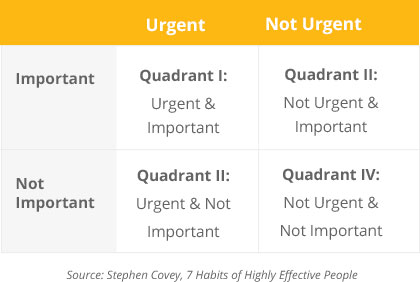Rewire These 5 Habits To Supercharge Your Productivity Levels
Rewire These 5 Habits To Supercharge Your Productivity Levels

Wouldn’t it be great to be more productive? Wouldn’t it be great to get more things done in a shorter amount of time?
Superhuman productivity levels are not something that only the few are gifted with – anyone can develop themselves to work more efficiently with just a few little tweaks. So where do you start? By identifying and transforming your unproductive work habits.
From creating an environment that helps you retain your focus to making a commitment to working less (yes, it sounds paradoxical!), these 5 habitual changes will empower you to accomplish more each and every day.
1. Allowing yourself to get distracted
With phone calls, meetings, emails, social media and advertising all vying for our time and energy, guarding our attention has become more important than ever. Every time we allow something to distract us, our mind wanders and we are forced to deplete more energy when consciously returning to the task at hand.
To guard ourselves against these distractions, we can take the initiative to shape how we work in a way that facilitates focus. For example, rather than replying to emails as they come in, attend to them in batches in the morning and afternoon. Rather than taking every call and message that comes through to your phone, keep it on silent when you are working. And rather than flicking through your social media accounts incessantly, log out or block them with apps like SelfControl.
By setting your own standard for how you work, you send a message to yourself and to the world that your focus matters.
2. Being a perfectionist
In a perfect world, we can spend hours upon hours on our work, and at its completion, it is perfect. However, the real world does not work like that as there comes a time when we must deliver what we have completed whether it is perfect or not. The most ironic part of the perfection mindset is that what we think is perfect often becomes less so once it is under the review of others.
So rather than dwelling on perfection, aim for progress. Do your best, then share it to gain feedback on what can be improved. This iterative process will boost your productivity levels and introduce rapid feedback loops that will help perfect your work.

3. Working without prioritisation
Every day brings a new list of tasks to complete. However, creating a list is just the start of working out what projects you need to work on as it is so easy to skip over the most pressing tasks in favour of what is easy.
Steven R. Covey, the author of The 7 Habits of Highly Effective People, proposes using a two-by-two matrix which categorises tasks into those that are “Important,” “Not Important,” “Urgent” and “Not Urgent.”
Quite simply, if a task lies in Quadrant 1, then it is the task that should be completed first. If a task lies in Quadrant 4, it is only to be worked on once all other tasks have been completed.
By prioritising your work in this manner, you will be compelled to complete what really matters – and at the end of the day, that’s what really matters!

4. Procrastination
We’ve all succumbed to procrastination at some point or another given the comfort and short-term relief that idleness offers. However, procrastination is horrible for productivity as it depletes energy without any output and places a weighty burden on our shoulders.
Instead of focussing your energies on aversion, focus it on imagination. Imagine how stress-free and fulfilled you will feel, as well as how free you will be to do whatever you want once you have finished the task. By reframing your work, you transform it from being something that makes your stomach turn into something that will facilitate the arousal of positive feelings.
5. Working long hours
While many of us feel that we need to put in more hours in the office to look like we are working hard, the number of hours that we work does not necessarily correlate with how effective we are in the workplace. In fact, a study conducted by social networking company, the Draugiem Group, found that their most productive employees worked no more hours than their peers and did not even work full eight-hour days. What these few employees did do was rest for 17 minutes for every 52 minutes of work that they conducted.
The longer we work without rest, the more susceptible to sluggishness and unproductivity we become – what normally takes half an hour ends up taking much longer. Instead of working longer, work smarter. Allocate a set period of time (e.g. 52 minutes) to complete a particular task, then once the timer is up, take a break (e.g. 17 minutes) away from the computer and get refreshed before setting the timer once again!
Reach out to our Skills Consultants to find out more about how you can transform your life through learning today!
You might like this
10 Reasons Why You Should Consider Being a Certified Information Systems Security Professional (CISSP)
10 Reasons Why You Should Consider Being a Certified Information Systems Security Professional (CISSP)
Upskilling for a new career post-retirement
Learning Never Stops: Reskilling for a Career Switch

